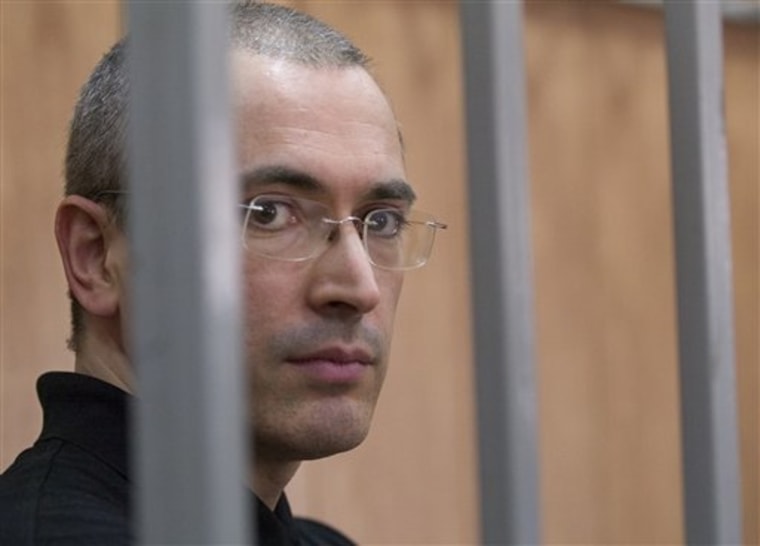Jailed tycoon Mikhail Khodorkovsky fired back at the state Friday for a yearlong attack on him and his former oil company Yukos, pledging to prove he is innocent of charges he called “absurd” and politically motivated.
Speaking from inside a metal cage he shared with his co-defendant in a Moscow courtroom, Khodorkovsky made his first formal response to fraud, forgery and tax evasion charges since he was arrested at gunpoint nearly nine months ago.
He told the three-judge panel that the Yukos oil company — battered by multibillion-dollar tax claims — had put more money into government coffers than other companies.
“In my opinion, society for a long time has not had any illusions about the underlying political motives in this case,” said Russia’s richest man, clad in a black polo shirt and jeans.
Khodorkovsky’s statement came a day after he pleaded not guilty to charges read by a state prosecutor in Meshchansky district court.
Many analysts see the prosecution as a Kremlin-driven effort to sap the billionaire’s clout and his possible political ambitions. As he built Yukos into Russia’s largest oil producer, Khodorkovsky challenged President Vladimir Putin on the issue of government corruption and financed liberal political parties.
The state says the actions are part of an anti-corruption drive, and Putin — while rarely mentioning Yukos or Khodorkovsky directly — has used the cases to emphasize the need for companies to support the government, not challenge it.
Khodorkovsky, whose growing power collided with Putin’s tightening control over Russia and its economy, said he would not dwell on the government’s alleged political motivations.
“I don’t want to shield myself from criminal accusations by making political declarations,” he said.
Instead, he vowed to refute the charges on their own merit.
“I shall prove their groundlessness not only from the point of view of the law ... I will also prove them absurd from the ethical point of view as I will show that Yukos paid not less taxes, but much more, than other companies,” he said, according to a statement transcript posted on a Web site maintained by supporters.
The case against Khodorkovsky and his co-defendant and business partner, Platon Lebedev, is part of a complex web of legal actions that includes a $3.4 billion back tax bill that Yukos says could force it into insolvency.
The charges against them center on the 1994 privatization of a company that makes a key fertilizer component — one of the deals that helped Khodorkovsky build his empire.
Prosecutors say they were part of an “organized group” that won a 20 percent stake in the company, Apatit, through a scheme involving shell structures that bid for the shares.
In his statement, Khodorkovsky called those charges “a worthless attempt to write off on me mistakes in the laws on privatization and in the subsequent activity of state bodies.”
The Apatit deal was one in a widely resented array of post-Soviet selloffs of state property in murky auctions that often brought prices far lower than the enterprises were believed to be worth.
Lebedev, who has told the court he is ill, also made a statement Friday, saying the charges against him were fabricated and that there is no proof of his guilt.
Defense lawyers said the court was biased, ruling exclusively in favor of the prosecutors. Attorney Karinna Moskalenko said the court refused to require prosecutors to provide evidence for keeping Lebedev in custody.
“The court is just taking the prosecutors’ word for it,” Moskalenko said, repeating a common denunciation of Russia’s judicial system, which critics say still clings to the Soviet-era tendency to assume guilt.
After the defendants spoke, prosecutor Dmitry Shokhin accused Khodorkovsky of distorting the facts and seeking to pressure the court by playing on public sentiment.
Judge Irina Kolesnikova adjourned the trial until Tuesday.
Yukos is struggling to find a compromise that would allow it to restructure its tax debts and keep the government from seizing its key assets. The government has had no reaction to Khodorkovsky’s offer to help settle the tax claim by turning over Yukos shares held by him and his close associates.
Khodorkovsky stepped down as Yukos chief executive after his arrest on Oct. 26.
In addition to the 2000 tax bill, tax authorities also have declared the company owes $3.3 billion for 2001 and large bills for other years also are expected. Analysts have suggested the company could be looking at a final bill of more than $10 billion.
